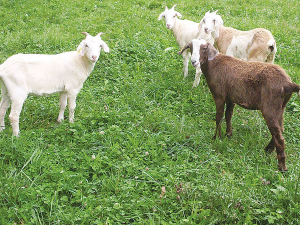New export records for Aussie goatmeat
The Australian goatmeat industry set a new record for production and exports last year.
 Garrick Batten believes that NZ now has the potential goat meat production base that needs commitment to supply, as well as coordinated and innovative marketing.
Garrick Batten believes that NZ now has the potential goat meat production base that needs commitment to supply, as well as coordinated and innovative marketing.
Hill country farmers cannot ignore the goat meat market opportunities such as in North America, according to goat farming expert Garrick Batten. He outlines why in the third of his three part series on the topic.
"We don't need to challenge Australia. We can focus on small markets with clear regional differences,” Batten explains.
“Like California’s annual imports of about 2,000 tonnes and capitalise on its closeness, and a market with compatible language, laws and no tariffs,”
He believes NZ could supply chilled, small carcases to meet consumer perceptions in California and that innovative processing and packaging costs can balance freight costs.
Batten claims also that consumers – especially Hispanic – paying a premium for grass-fed lamb is an opportunity to promote NZ grass-fed goat meat, as opposed to the grain-fed local supply.
His market analysis shows a strong premiumpriced festival demand for 7-11kg whole carcases from December through until May that would suit a NZ product. Grade S2 carcases of 9kg have a similar price to the 11.5kg used in the previous article. At Christmas 2021, the live auction price reached $30 per kg carcase weight.
“Producing 16 to 25kg live weight kids – many off their mothers – with preferred, light-coloured, tender flesh suits this market timing,” he adds. “And early finished, lightweight meat is more GHG efficient.”
In Batten’s opinion, this could add $45 per ha or $20,000 directly to typical NZ hill country farms.
“Sending slaughter kids off the farm early also helps increase doe mating weights to improve reproductive rate,” he says. “This is inherently high in goats— where litter weaning weight per doe is a key KPI.”
Challenged about farmers’ bad experiences with goats in earlier years, Batten says that we now know a lot more about pastoral farming goats.
“We now have simple and cheap goat management systems, which solve earlier problems in producing meat,” he claims. “Goats can be easy to manage for meat production with the right mindset to understand they are different.”
He asks if goat meat production is too simple, not sexy or sufficiently tech-oriented in its longer term forward thinking.
“That seems to be the opinion of MPI support services,” Batten claims.
“And B+LNZ – who does not recognise goats as an integral part of farm management for their potential role in sustainable weed control, clover enhancement and more direct and indirect income.”
Processors Need To Play Their Part
Garrick Batten believes that goat farmer returns and interest have suffered due to processing issues.
Despite this, he claims that annual FOB goat meat prices have been similar – and in some cases exceeded – lamb. “Developing any market needs commitment, resources and time for producing, processing and marketing with many opportunities for innovation and development at each stage,” he concludes. “Farmers have never been easy to coordinate and maintain their business objectives. But this meat opportunity can generate the necessary mass and momentum of the 1980s national fibre goat boom from 30 000 to 1.3 million in eight years.”
Batten believes the potential production base now needs commitment to supply, as well as coordinated and innovative marketing. He hopes to be part of that.
More: www.caprinexnz.com
New Zealand's new Special Agricultural Trade Envoy, Horowhenua dairy farmer, company director and former Minister of Agriculture, Nathan Guy says the Free Trade Agreement (FTA) with India is a good deal for the country.
New figures show dairy farmers are not only holding on to their international workforce, but are also supporting those staff to step into higher-skilled roles on farm.
New tractor deliveries for 2025 jumped 10% compared to the previous year, a reflection of the positive primary sector outlook, according to the Tractor and Machinery Association (TAMA).
Entries have opened for two awards in the New Zealand Dairy Industry Awards (NZDIA) programme, aimed at helping young farmers progress to farm ownership.
Federated Farmers has confirmed interim chief executive Mike Siermans to the role.
Registrations are now open for the 2026 Ruralco Golf Classic, with all proceeds from the event set to support the Mid Canterbury Rural Support Trust.

OPINION: If the hand-wringing, cravat and bow-tie wearing commentariat of a left-leaning persuasion had any influence on global markets, we'd…
OPINION: With Winston Peters playing politics with the PM's Indian FTA, all eyes will be on Labour who have the…